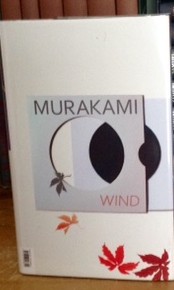Inspiring Older Readers
 posted on 14 Aug 2015
posted on 14 Aug 2015
Hear the Wind Sing / Pinball by Haruki Murakami
In all honesty, there isn't a great deal to say about these two novellas packaged together, box and coxed in a single volume. These are two early pieces of work that have never been translated or published in the UK before and so for Murakami devotees they are probably indispensible. Both pieces of work introduce us to characters - the Rat and J (of J's Bar fame) - who also appear in the novel Murukami has always considered his first real novel, A Wild Sheep Chase, and utilise the same voice and quirky reliance on a mash-up of Western pop culture and the interface between this melage and traditional Japanese society..
Such is the cult that has built itself around Murakami, I would guess that his legions of fans will love these. Although the author was initially reluctant to have them translated he has now embraced them as an important foundation for the writer he would become. And they are unmistakable as Murakami pieces - although there is a feeling of pastiche about them. There is something slightly stiff, self-conscious and knowing about the style that his more mature works don't have and the characters feel less quirky and endearing than irritating and unnecessarily oblique. This may be the consequence of a specific stylistic trick that the author lets us into in his preface - the fact that the books are written in English and translated back into Japanese. Because Murakami's grasp of English was relatively basic, he is forced to write simple short sentences and these, when translated back to Japanese, create his new voice. So these pieces we are reading are written in English that has been translated back into Japanese and then again into English. An almost perfect post-modernism for a master of the post-modern novel.
Within the stories nothing much happens. The young male narrator of Wind, home from college for the summer lives a chaotic, introverted life and is drawn to others who are themselves full of enigma and who fail to make real relationships. In this case the focus of fascination centres on a young woman with only nine fingers who starts off despising him and grows to be attached to him without either of them being able to commit. The story is saturated in cigarette smoke, alcohol, vinyl records and a sort of weary regret for past lost relationships.
 Pinball cranks up the sense of unconnected lives. The narrator works as a translator, mysteriously lives and sleeps with twins whose back story is never explained and becomes oddly addicted to one specific pinball machine that he discovers is uniquely addictive and astonishingly rare - only 3 exist in the whole of Japan.. Again, smoking, drinking and a complete failure to make relationships or real emotional connections dominate the enigmatic narrative.
Pinball cranks up the sense of unconnected lives. The narrator works as a translator, mysteriously lives and sleeps with twins whose back story is never explained and becomes oddly addicted to one specific pinball machine that he discovers is uniquely addictive and astonishingly rare - only 3 exist in the whole of Japan.. Again, smoking, drinking and a complete failure to make relationships or real emotional connections dominate the enigmatic narrative.
Murakami is definitely a 'marmite' author - I suspect you either love him or are mystified by his appeal. I fall into the former group; I've loved everything of his that I've read and I find his distinctly ideosyncratic style compelling and involving. But to be honest, I could have done without these squibs. I read them and I was drawn in by the Murakami trade marks but it always felt like I was assessing them as an academic exercise - looking for signs of the master that would emerge in later works. If you love Murakami you'll probably already have a copy but if you haven't read him before I would advise you to start with some of his later work and maybe backtrack to these once you're into the Murakami world.
Terry Potter
August 2015